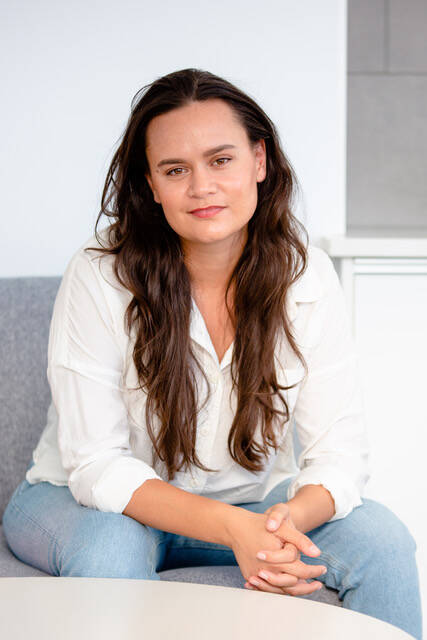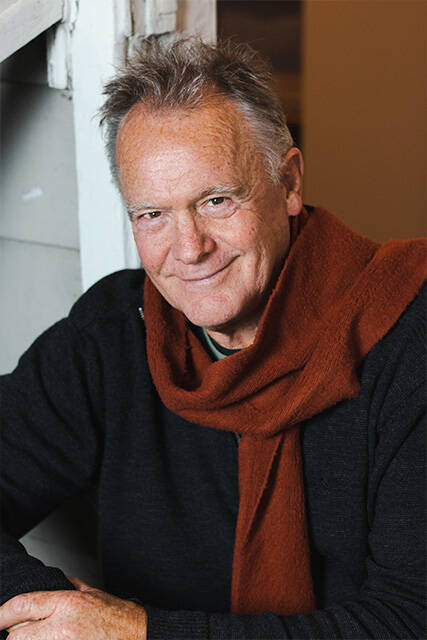Meet the Makers: Prima Facie
Meet Acushla-Tara Kupe and Paul Gittins, creatives behind the New Zealand premiere of Suzie Miller's 2023 Olivier Award-winning and critically acclaimed one-woman play Prima Facie.
Don’t miss the masterpiece that has been blowing away Broadway and West End audiences, on at the Herald Theatre, Aotea Centre from Wednesday 21 June – Sunday 9 July.
Who are you, and what is your role in Prima Facie?

Acushla-Tara: Kia ora, ko Acushla-Tara Kupe tōku ingoa, he uri tēnei nō Ngāti Maniapoto. Ko Tessa Ensler taku kiripuaki. Kia ora, my name is Acushla-Tara Kupe, I am of Ngāti Maniapoto descent, and I play Tessa Ensler.
Tessa is a criminal defence barrister who has worked incredibly hard to get where she is, in both her career and her life. She's determined, tenacious, and really good at her job. Through the course of the play, we see her unshakable nature falter and fracture as she experiences the unforgivable, leading her to stand on the other side of the legal system for the first time.

Paul: I am Paul Gittins, and I am the director of the play. I also represent the production company Plumb Theatre who, in conjunction with Auckland Live, are mounting Prima Facie.
This means I actually wear quite a few hats. I do a lot of the admin for Plumb, which involves funding applications, applying for rights to plays, keeping Plumb's GST up to date and many other jobs, but what makes it all worthwhile is when I can finally get into the rehearsal room with the actors (or in this case actor) and start rehearsing.
What's your favourite aspect of what you do?
Acushla-Tara: I think one of the best things about being an actor is the variety. One minute you're playing a detective in small-town Aotearoa, the next you're a criminal defence barrister, and somewhere in the middle you're a fitness instructor for a day or two!
All this variety means we, as actors, get to experience so many different lives and perspectives. Learning so much about what it is to be human. I think spending so much time in other people's shoes can feed your gratitude and empathy as well when you have that deeper understanding of what it might be like to be in someone else's situation. That, and meeting new people on every job!
Paul: Definitely the rehearsal process. No matter what kind of vision you have as a director, rehearsing a play is such an organic process that it will always surprise you by throwing up interesting and alternative ideas.
Having been an actor, I do believe it is a great help in understanding the actors' process as they work their way through a role. Getting out of the way of an actor's creative process can be just as important as offering options to them. The start of rehearsals on a new play is always exciting. New material, different actors, a completely new experience to look forward to.
What's your why? Why do you do what you do?
Acushla-Tara: I've got a couple of whys:
- I just love the work. Playing make-believe, inhabiting another spirit for a time. It brings a light and a joy to my soul, and I can't imagine life without it.
- Entertainment. For both myself and an audience. Escapism is a rongoā and can be really healing.
- Teaching and learning. As well as providing entertainment, theatre and film can be a tool to learn, grow, teach, and spread important ideas. I've learnt more through theatre about the world and being human than I've learnt anywhere else.
Paul: It is a cliché to say - it is what gets me out of bed in the morning - but it is true. To me, the mystery of life has always been a maddening tease, and distraction seems to be the best way of dealing with it. Theatre has always provided me with the best form of distraction.
I find, in a small way, it shines some light into the dark void of why we are here. Working with great literature especially is really rewarding. There are seldom any answers to be found; it's nice to feel connected to those asking the questions.
Every play I have ever had the good fortune to be in or to direct has, for a short time, immersed me in a world outside my daily existence. What a joy being able to constantly jump into the lives and experiences of some dramatists' fascinating creations.
Can you remember a show that impacted your life?
Acushla-Tara: Aside from Prima Facie, although there are many, one that's stuck with me is Emilia! by Morgan Lloyd Malcolm.
Long before performing it myself, I remember seeing it on the West End. When it finished, I distinctly remember saying out loud, "This is the kind of theatre I want to make". It moved me. It moved the whole audience. We were quite literally roaring at the end, a battle cry invoked by the performances and the kaupapa. One of the main threads of that show was female empowerment. Taking what is rightfully yours, standing in your power, and bringing those around you with you on the way up. Emilia! was, and continues to be, a strong presence in my life.
Paul: I was in my twenties and still wondering what to do with my life. I was visiting Sydney, Australia and saw that this show called Equus was on.
The only night I was able to go was sold out, but I turned up anyway and managed to get a return. It was a great seat, dead centre and about four rows from the front. I had no idea what the play was about but for the next couple of hours was completely captivated by the experience that unfolded.
The way the play tapped into something deep and mythical to do with the horses, and the clever way they were portrayed, stayed with me for ages. On returning to NZ, I decided I wanted to be an actor and joined the newly formed Theatre Corporate. Peter Shaffer's play Equus was responsible for that.
What drew you to Prima Facie?
Acushla-Tara: Originally it was the reputation it was gaining, with Jodie Comer as Tessa in the National Theatre production. That inspired me to buy the playscript, and once I'd read it, I immediately read it again, and again.
Although it is, unfortunately, not a unique story, it's told from a refreshingly new perspective. It really challenges what you believe to be true and right. You find yourself torn, and at times tangled in a messy spider's web of morality.
The imagery hooked me too. Suzie Miller paints the scenes in such a vivid manner you find yourself completely sucked into Tessa's world.
Paul: I was hunting around the internet to see if there were any new small-cast plays that had enjoyed critical success and came across Prima Facie not long after it had opened in Sydney. I sent off for the script, and after reading it, I immediately sent off for the rights.
Here was a play written with passion and a lawyer's insight into a hugely important legal issue. It was so cleverly constructed that it didn't feel like a solo show at all. All the characters in the play seem to populate the stage by way of the audience's imagination. I loved it and felt it was a perfect fit for Plumb Theatre.
This was in 2020, and unfortunately, Covid put paid to mounting a production then. Subsequently, the play gained a lot of attention after the London production starring Jodie Comer. This prompted me into action, and with Covid restrictions now an unpleasant memory, the path was clear to go ahead again.
What are you looking forward to most about bringing Prima Facie to the stage?
Acushla-Tara: I'm just really excited for New Zealand audiences to experience this show in the flesh. It's such an important story to tell. One that hopefully ignites important conversations in the places they need to be happening.
Also, the challenge of doing a one-person show. This'll be my first, and I'm looking forward to that wero.
Paul: Well, there are two outcomes I am hoping for. First, is that I want the audience to witness a first-class production with an astounding performance from Acushla-Tara Kupe at its heart. The play has such potential to engage deeply with an audience on so many levels. I want it to be a thoroughly entertaining and moving experience that leaves the audience with plenty to think about.
This leads to the second outcome. The play has been written to raise awareness about how the legal system lets down women survivors of sexual assault. I would really hope that, in some small way, the play can contribute to the ongoing discussion of this issue that the #MeToo movement has brought a more intense focus to.
What can audiences expect from Prima Facie?
Acushla-Tara: Audiences can expect a hard, thought-provoking, confronting, and at times quite funny show. It's not an easy watch, but it's an important one. A 2021 study through the Ministry of Justice found that more than 1 in every 5 New Zealand adults experience sexual assault during their lifetime. Prima Facie tells one version of this experience, and I hope people can find learning, empathy, processing, and enlightenment through watching this show.
Paul: First and foremost, they will see the play's central character Tessa Ensler come to life in a riveting performance from the very talented Acushla-Tara Kupe, whose star is deservedly on the rise.
I also have no doubt the Auckland audience will experience the same kind of exhilarating visceral response to the play that audiences in Sydney, London and Broadway have already experienced. Furthermore, they will see a play with Plumb Theatre's signature high production values put together by a team of very experienced creatives.
And finally, if they weren't already aware, they can expect to be left thinking about and impacted by the play's content. How the justice system is badly failing women who have sought redress for sexual assault through the courts.
Why should people go to the theatre?
Acushla-Tara: Sharing the room, sharing breath with the performers and audience members, the immediacy of the storytelling is an experience that can't be found anywhere else. It's primal. Storytelling is such an inherent part of humanity. I say to people who tell me they don't enjoy live theatre, "You just haven't found the right flavour yet."
Paul: To keep theatre practitioners employed would be one good reason! Other than that, it is a good question.
In its origins people went to the theatre to honour their gods, such as the Greeks did with Dionysus. Early English theatre grew out of Mystery cycles and Miracle plays. In these examples there was a spiritual component to attending theatre, which today is no longer a necessary part of the equation. So why should people come to the theatre now?
Hamlet's opinion is that the "purpose of playing is to hold as 'twere the mirror up to nature: to show virtue her feature, scorn her own image, and the very age and body of the time his form and pressure." So providing we as theatre practitioners are holding that mirror up to nature, whether it be through comedy, drama, opera, stand-up or whatever, then it makes sense that people should come along and enjoy, hate, agree, or disagree, but at least play their part in this process.

